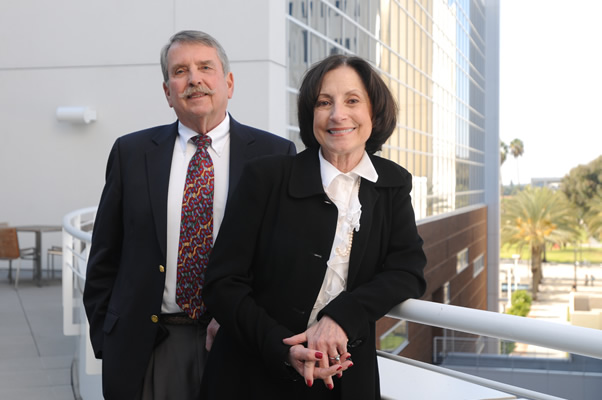Learning the Intangibles of Leadership
New Center Plans Special Programs, Workshops to Develop Awareness and Skills
December 15, 2009
By Pamela McLaren
What is leadership? How do we develop it and incorporate it into our careers?
A new center — a collaboration between the College of Communications and Mihaylo College of Business and Economics — has been established to help develop programs and initiatives to help Cal State Fullerton students learn and develop leadership skills.
The brainchild of the effort came about a year ago with discussion of a minor in leadership. Discussions among Anil Puri, dean of the Mihaylo College of Business and Economics; Rick Pullen, dean of the College of Communications; and S. Irene Matz, associate dean, College of Communications, led to a proposal that Puri presented to the Council of Deans for approval.
“There are a growing number of students seeking the skills it takes to be a strong leader,” said Matz, who has taught courses in business and communications and conducted research on leadership. While a minor is still in the works, Matz and B. Thomas Mayes, professor of management, moved forward on development of the center.
“The mandate for business schools is to develop programs that build effective leaders, yet we currently expect students to learn leadership skills mainly through extracurricular activities,” said Mayes, who also heads Mihaylo’s Student Outcomes Assessment Center, which measures business student skills and knowledge. “We believe that leadership education must be a carefully planned educational program that can foster the development of reflective, informed leadership.”
Because the best form of learning is a combination of theory and practice, Matz and Mayes contend that students should be provided with learning situations in the classroom and elsewhere to develop their leadership potential. The center will drive the development of a leadership curriculum within the colleges and generate external experiential opportunities so that students will have the opportunity to improve their leadership capability.
“We see it expanding on campus through seminars, classes and interactive sessions with top community and organization leaders, said Matz. “We’re also planning a leader-in-residence program and a spring leadership conference.”
The leadership conference, scheduled for April 23, 2010, is themed “Leadership in Times of Uncertainty and Scarcity” and will feature Jay Conger as the keynote speaker. Conger is professor of leadership studies at Claremont McKenna College and co-author or editor of 14 books, including “The Practice of Leadership” and “Growing Your Company’s Leaders.”
In addition to Conger’s lecture and workshop, the conference will have a session featuring researchers in the area of mental and physical performance enhancement through brain wave feedback training and panel presentations featuring CEOs in the fields of media, entertainment and technology.
Also planned for next spring is a leadership academy offering a variety of short courses and workshops that focus on development of leadership skills. The target audience is not only Cal State Fullerton students, but mid-to-upper-level managers in such fields as business, education and communications. Participants who complete the academy training will earn certificates of completion.
Another component of the center is research. “Our first grant proposal has been submitted to the Graduate Management Admissions Council’s Management Education and Research Institute for an investigation into the antecedents and outcomes of managerial interpersonal skills," said Mayes. “Where there is much discussion these days about these skills, there is little agreement about just what these skills entail."
The study, when funded, will be conducted by management faculty members Gerard Beenen, Lori A. Muse and Shaun M. Pichler. They hope to identify what such skills are, how they may be developed and the effects on organizational performance if managers have these skills.
Matz and Mayes cited other possible research project topics: leadership across cultures, challenges to practicing ethical leadership in a global economic environment, managing change and effective leadership in the government or nonprofit sector.
“Linkages will be developed with regional universities and institutions to perform joint research projects and host conferences, thereby strengthening our impact,” said Mayes.
“In the future, we can see the development of collaborations with various areas of the campus, including student affairs and ROTC,” he added. “Studies have proven that schools do a great job on technical skills, but we must give students the soft skills — like leadership — to succeed in their careers.”
“We see this as not just a collaboration of two colleges, but a campuswide effort for all colleges,” he added.
“Even though graduates from our university may not become leaders in their fields, they do need to be aware of what to expect from leaders … to know the importance of leadership in their fields, their communities and in today's world,” said Matz. “We’re excited to have this opportunity to expand student skills, to motivate them and to excite them to what they can do and achieve.”


